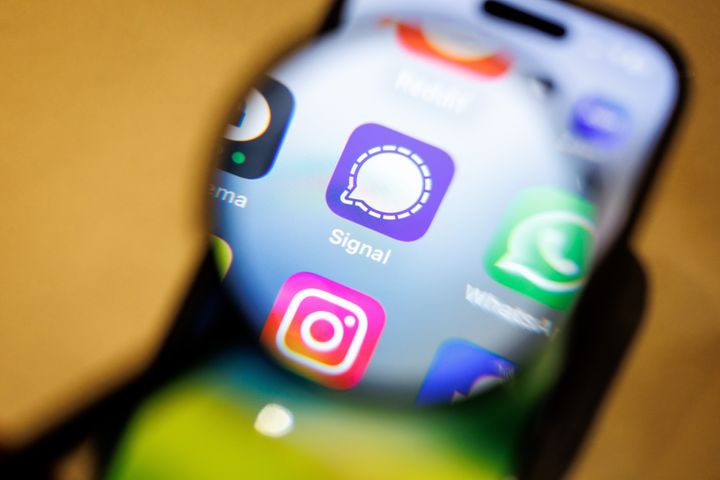If You’re Worried About Privacy Under Trump, This 1 App Can Help
Under Donald Trump’s administration, paranoia about surveillance is not just a fear ― it’s a reality for many federal workers who are incentivized to watch and report on their coworkers’ activities.
As a result, more federal employees are reportedly downloading and using the Signal chat app for the first time to communicate with each other about their jobs and their opinions about leadership.
Advertisement
Should you do the same? Even if you are not a person who works with a federal agency, you might want to talk more securely about banned books, health care concerns, “DEI” initiatives or other topics made controversial by the Trump administration.
That’s when you should consider the advantages of an end-to-end encryption messaging app like Signal, privacy experts say.
Why Privacy Experts Recommend Signal
The safest way to keep an online conversation more private is to use end-to-end encryption, which is what Signal, an independent nonprofit, uses for its messaging and call app.
Advertisement
End-to-end encryption means that the content and metadata within your messages are encrypted locally and are never stored on Signal’s servers. In this way, only your intended recipient can read your messages.
“It’s set up that the encryption key is local on your phone, so not even the people that run Signal can get to your data,” said Aaron Pritz, CEO of cybersecurity firm Reveal Risk. Because Signal “doesn’t have the encryption keys, they can’t provide to government entities or whatnot, the ability for them to pull the data.“
And that is the exact scenario government workers are worried about.
Federal employees reportedly fear that major tech companies like Meta ― which owns Whatsapp and Facebook Messenger, and whose CEO was pictured in a front-row seat at Trump’s inauguration ― would turn over information to the government. Meta itself reported that from January to June of 2024, it received 81,884 government requests for U.S. user data, and 87% of the time, it produced “some data” in response.
Advertisement
In contrast, take what happened to Signal when it got a subpoena by a U.S. government attorney in 2021 to hand over data about one of its users. Signal could only share when the account was created and the date that the account was last connected to the Signal service ― and not any of the other metadata like that person’s name, address, correspondence, contacts or call records.
As Signal states, because of end-to-end encryption, “Signal doesn’t have access to your messages; your chat list; your groups; your contacts; your stickers; your profile name or avatar; or even the GIFs you search for.”
One other Signal advantage? Signal gives all users the same privacy experience, regardless of which devices people use.
Advertisement
“Everyone has the same settings [on Signal,] which means that everyone’s going to have at least core basic protections just enabled by default,” said Thorin Klosowski, a security and privacy activist for the Electronic Frontier Foundation who uses Signal.
In contrast, Apple’s end-to-end encryption only applies if everyone you chat with is also using an Apple device. This means that as long as one person in your group chat is using an Android device, no one’s texts in Apple’s Messages app are end-to-end encrypted.
In other words, that green text color you see when an Android device is messaging you is Apple signaling that you are talking with an Android user ― and that your privacy is compromised.
Advertisement
Similarly, Google’s chat app is also only end-to-end encrypted if everyone is using its app.
Pritz, who uses Signal for group chats, said it also works seamlessly between Android and iPhone users. “Just from a usability standpoint, [Signal] can make those group threads much easier,” he said.
And if you’re someone who gets overwhelmed by constant group notifications, “It can be used to compartmentalize specific conversations that you don’t want in any normal text thread,” Pritz said.
Beyond end-to-end encryption, Signal has features that help you limit the information you share. You can set messages to delete after a certain time, and turn off backups to chat history, as two examples. You can sign up to use Signal on your iOS or Android device or desktop.
Advertisement

picture alliance via Getty Images
The Downsides Of Signal
Just because Signal chats are end-to-end encrypted does not mean your private conversation is guaranteed to stay private, however.
“If someone had physical access to a phone, they would be able to obviously see whatever conversations are happening on it. If it’s unlocked, people can screenshot. You can record calls,” Klosowski said as examples.
Advertisement
There are steps to limit your Signal account from being used on unwanted devices. You can require Signal to enable a registration lock if your number is registered on another device, for example.
Privacy experts recommended using Signal only on your personal devices over your work-issued devices because your company may have access to information about which apps are installed, too. And it could go against your employer’s technology use policy.
“I’ve seen a lot of circumstances where maybe somebody didn’t realize that they were creating risk, and they did, and they didn’t ask,” Pritz said.
Advertisement
Ultimately, if you want a secret to be kept secret, it still depends on how much you trust the people in your group chat ― even if it is on a secure messaging app like Signal.
“If it’s a lot of people, or people at one workplace [in your group chat], any one of them could be screenshotting or recording,” Klosowski said.

Comments are closed.